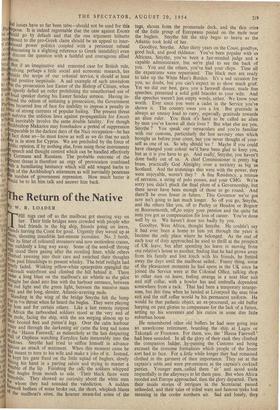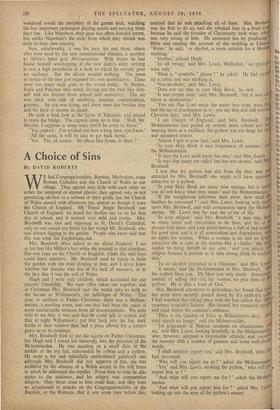le Return of the Native
W. R. LOADER -4HE tugs cast off as the mailboat got steering way on her. Their little bridges were crowded with people who !fiends leaving the Coast for good. Urgently they waved up at then, shouting inaudible last-minute jocosities. No. 3 berth, kin stood there gazing after the receding liner, while others °limbed yawning into their cars and switched their thoughts from past friendships to present whisky. The brief twilight had with its litter of coloured streamers-and now motionless cranes. Takoradi waterfront and climbed the hill behind it. There was suddenly a long way away. Some the send-off throng rly faded. Winking yellow-white spearpoints spangled the had friends in the big ship, friends going on leave, brought a long blast on the mailboat's air whistle as the pilot urciught her dead into line with the harbour entrance, between the red light and the green light, between the massive main (NY and the long, slender, Atlantic-averting mole. Standing in the wing of the bridge Smythe felt the lump Ilse in his throat when he heard the bugles. They were playing for him and for certain others. Like a last remote outpost Of Africa the tarbooshed soldiers stood at the very end of the a Mole, facing the ship, with the sea surging almost up to "err booted feet and puttee'd legs. Over the calm harbour water and through the darkening air came the long sad notes Of the ' Hausa Farewell,' as melancholy as.the last despairing Fail of Orpheus watching Eurydice fade inexorably into the shadows. -Smythe had tried to stiffen himself in advance against an attack of sentiment. When this moment came he (tad be meant to turn to his wife and make a joke of it. Instead, kept his gaze fixed on the little squad of buglers, slowly tais ut ing his hand in a parting salute and trying to master a tremble of the lip. Finishing the call, the soldiers whipped ac %tiekik bugles from mouth to side. Their black faces were rc mobile. They showed no curiosity about the white men lOr whom 'they had sounded the valediction. A sudden "Irewell bedlam of noise broke out, the short, whiplash blasts of the mailboat's siren, the hoarser steam-fed notes of the tugs, shouts from the promenade deck, and the thin cries of the little group of Europeans posted on- the mole near the buglers. Smythe felt the ship begin to heave as the Atlantic took hold of her.
Goodbye, Smythe. After thirty years on the Coast, goodbye, good luck, and good riddance. You've been popular with us Africans, Smythe, you've been a fair-minded judge and a capable administrator, but we're glad to see the back of you. You and the others, you've had your chips. Time all the expatriates were repatriated. The black men are ready to take up the White Man's Burden. It's a sad occasion for you, no doubt, but you can't expect us to show much grief. Yet we did our best, gave you a farewell dinner, made fine speeches, presented a solid gold bracelet to your wife. And the speeches weren't just empty words, either. We know your worth. Ever since you were a cadet in the Service you've shown it. The country owes you a lot. But gratitude is always an uneasy load to carry, especially gratitude towards an alien ruler. You think it's hard to be called an alien by men you've known all their lives ? But what else are you, Smythe ? You speak our vernaculars and you're familiar with our customs, particularly the less savoury ones which brought us before your court, but you never thought of your- self as one of us. So why should we '? Maybe if you could have changed your colour we'd have been glad to keep you, but as it is you have to go. And really, Smythe. you haven't done badly out of us. A chief Commissioner is pretty big brass, practically God Almighty over a territory as big as Scotland. And the trimmings that went with the power, they were enjoyable, weren't they ? A fine Residency, a retinue of servants, a string of polo ponies, and your CMG. We're sorry you didn't pluck the final plum of a Governorship, but there never have been enough of those to go round. And there'll be even fewer in future. This Governor we've got now isn't going to last much longer. So off you go, Smythe, and the others like you, off to Purley or Hendon or Bognor or Bournemouth, off,to enjoy sour pension and the quite fat sum you got as compensation for loss of career. You've done well by us. We haven't done too badly by you.
Goodbye, West Africa, thought Smythe. He couldn't say it had ever been a home to him yet through the years it became the only place where he belonged. As the end of each tour of duty approached he used to thrill at the prospect of UK leave, but after spending his leave in moving from one relative's house to another, finding that he had grown away from his family and lost touch with his friends, he fretted away the days until the mailboat sailed. Funny thing. some of the pleasantest moments he had spent in the UK since he joined the Service were at the Colonial Office, talking shop to other men on leave, feeling strange in a neat blue suit and stiff collar, with a bowler hat and umbrella dependent somewhere from a rack. That had been a temporary strange- ness, but this time when he landed at Liverpool the neat blue suit and the stiff collar would be his permanent uniform. Ha would be that pathetic object, an ex-proconsul, an old buffer harping on past glories to compensate for the lack of a future. setting up his souvenirs and his curios in some dim little suburban house.
He remembered other old buffers he had seen going into an unwelcome retirement, boarding the ship at Lagos or Takoradi or Freetown. For them, too, the Hausa Farewell ' had been sounded. In all the glory of their rank they climbed the companion ladder, by-passing the Customs' and being excused the tiresome formalities which' people of the lesser sort had to face. For a little while longer they had remained clothed in the garment of their importance. They sat at the captain's table and were pre-eminent at the captain's cocktail parties. Younger men called them ' sir ' and stood aside respectfully in the alleyways to let them pass. But when Africa receded and Europe approached, then the glory departed. Then their inside stories of intrigues in the Secretariat passed unheeded, and their tales of tribal wars and famous treks lost meaning in the cooler northern air. Sad and lonely, they wandered round the periphery of the games deck, watching the less important passengers playing quoits and envying them their fun. Like Napoleon, their gaze was often directed astern, but unlike Napoleon's the exile' from which they shrank was exile in their own country.
Now, unbelievably, it was his turn, his and those others who were axed by the new constitutional changes, a sacrifice to Africa's latest god, Africanisation. With shame he had found himself worshipping at the new deity's altar, striving to win a high priesthood in a faith to which he secretly gave no credence. But the efforts availed nothing. The mere existence of the new god required his own annihilation. There were too many such gods in the world today. In Burma, India and Pakistan they ruled, driving out the men like him- self and his friends from school and university. The air was thick with- talk of abolition, pension, compensation, gratuity. An era was dying, and there were few besides him and his kind to mourn its ,death.
He took a final look at the lights of Takoradi, and turned to leave the bridge. The captain came up to him. Well, Mr. Smythe, I suppose in some ways you'll be sorry to leave? '
Yes, captain. I've worked out here a long time, you know.'
' All the same, it will be nice to get back home.'
Yes. Yes, of course. No place like home, is there ? '



































 Previous page
Previous page